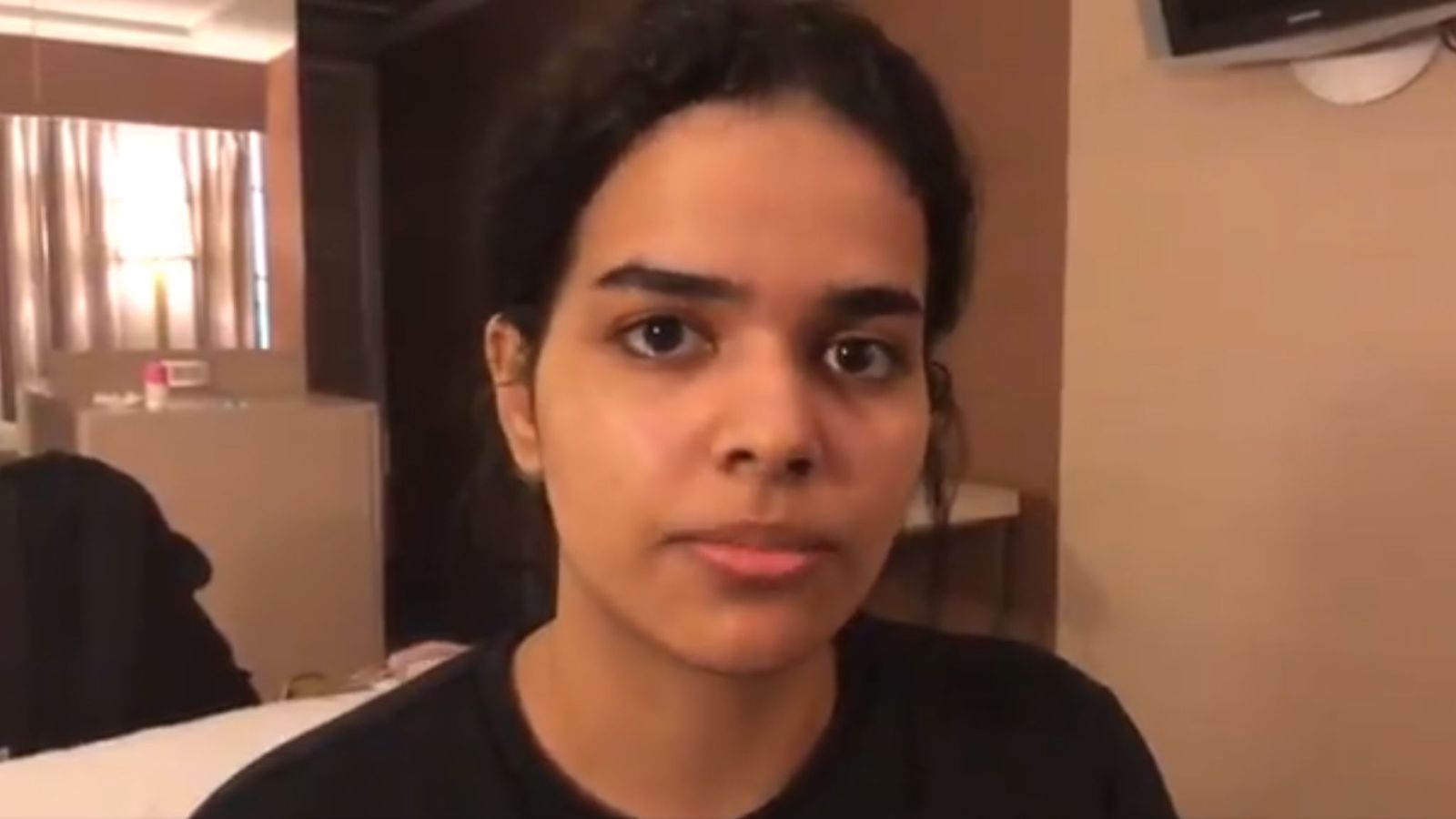


The plight of a 20-year-old woman from Saudi Arabia, intending to seek asylum in Australia, has gone viral under the hashtag #FreeRahaf over the weekend.
The International Humanist and Ethical Union (IHEU) implores all “rights-respecting governments to work together to guarantee her security and freedom”.

Rahaf Mohammed al-Qunun in a still from a self-filmed video, in the hotel room in which she has barricaded herself
Using social media, Rahaf Mohammed al-Qunun raised the alarm after she was denied access to a flight from Thailand to Australia. In a series of messages she said that she had been threatened with death for “trivial” reasons by members of her family and iIn one video she said: “…I, Rahaf Mohamed, an formally seeking refugee status to any country that would protect me from getting harassed or killed due to leaving my religion and torture from my family.”
She told the BBC she had “renounced religion”. Rahaf also highlighted alleged death threats from her cousin, and her father’s political position raised further concerns about the family’s power to have Rahaf deported.
While some accounts apparently based in Saudi have said that Rahaf is a “child” and should be returned to her family, Rahaf herself tweeted (in Arabic): “I am 20 years old and I can live alone, free, independent away from everyone who has not respected my dignity and has not respected me as a woman.” Though some reports suggest that she had been living with family in Kuwait and would be deported there, her own account said she had been living in Saudi Arabia. Whether deported to Kuwait or Saudi Arabia, she fears violent reprisal by family.
Rahaf has reportedly now spoken with the United Nations Refugee Agency, UNHCR and in a press conference in the past few hours, the head of Thailand’s Immigration Bureau Lt. Gen. Surachate Hakparn said that Rahaf would not be forcibly deported: “If deporting her would result in her death, we definitely wouldn’t want to do that,” Surachate Hakparn is quoted as saying. On Saudi Arabia’s death penalty for renouncing Islam, he said “their laws are like that.” Then he pledged, “Since Thailand is the Land of Smiles, of course we won’t send someone to their death.”
President of the IHEU, Andrew Copson, comments:
“It is welcome news if true that authorities in Thailand have now pledged not to deport Rahaf Mohammed al-Qunun to any country where she is at risk of being oppressively controlled or even faces the threat of violence or death for her values and beliefs. We implore rights-respecting governments to work together to guarantee her security and freedom.
“This case also highlights the wider need for urgent legal reforms in states where ‘renouncing religion’ is treated as a crime, even as a capital crime, under ‘blasphemy’ or ‘apostasy’ laws, or where social practices mean that women especially may have their personal lives controlled by family members and have limited rights against coercion and domestic violence.”
Under the internationally recognized principle of “non-refoulement“, refugees or asylum-seekers should not be deported to countries where their “life or freedom” is threatened due to “race, religion, nationality, membership of a particular social group or political opinion.” Saudi Arabia outlaws ‘apostasy’ as a capital crime under hudud-based laws, and designates “promoting atheist thought” as a terrorist offence, also punishable by death.
The IHEU regularly speaks out against the oppression of women and other human rights violations in various states including Saudi Arabia. Saudi Arabia was found to be the worst country in the world for non-religious rights in IHEU’s Freedom of Thought Report 2018, which surveys forms of legal discrimination and persecution against humanists, atheists and the non-religious in every country.
The IHEU protested Saudi Arabia’s place on the UN women’s rights commission in 2017, saying that “whatever political manoeuvre or strategic trade-off may or may not be behind this decision, it brings our valuable international institutions into disrepute.”